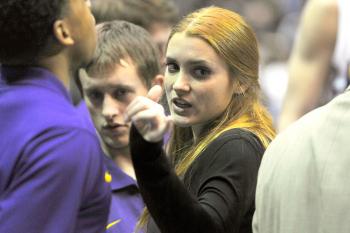
Hope Wildharber
Photo by Javier Fernandez
Determination is the name of the game for LSU trainer
By JENNIFER VANCE
Manship News Service
Awake by 7 o’clock every morning, Hope Wildharber’s days are long.
Although her classes finish by noon, she can’t go home and nap like many students. Instead, the LSU athletic trainer works practices and games for the LSU men’s basketball team, often staying on campus until late into the night.
“Whatever time anything starts, we get there an hour early,” Wildharber said.
The Youngsville junior spent her athletic time playing high school volleyball and soccer. After she sustained a knee injury during a soccer tournament, she became close with her high school’s athletic trainer.
She said her high school experiences gave her the idea to major in athletic training.
Wildharber said the time before games is laid back. Players will come in and have their ankles taped and then participate in a shoot-around. There’s a break for lunch, and everything will resume about two hours before the game starts.
As a student, Wildharber said her job at games is to learn from senior associate athletic trainer, Shawn Eddy, and observe how he handles different situations.
Occasionally, notes Wildharber, staff members will allow students to work on players during the game if the students feel confident enough to handle the situation.
Trainers get to know the athletes quickly because they frequently spend multiple hours together.
Wildharber, who worked for the LSU softball team during her freshman year, said working with males and females is different, as are the athletes needs in the various sports.
Athletic training junior Marissa Robles has known Wildharber since her freshman year. Robles said the hectic schedule of the program requires a certain type of person to handle the stress.
“You have to be very determined,” Robles said. “You have to be committed to (and) a passion for what you do.”
Wildharber worked with associate athletic trainer Pamela Workman during her year with the softball team. Workman said Wildharber was someone who promoted positive thinking among team members, even if the person was injured.
Workman said she tries to involve students like Wildharber as much as she can during games, adding “this is their education; we get to be very hands on.”
Athletic training students start their first year with orthopedic injuries, starting with the feet and working their way up.
They also learn about first aid and how to handle emergencies. Wildharber is currently taking a class on therapeutic exercise and rehabilitation.
Students also take a practicum class every semester that allows them to gain real-world experience by working with various LSU sports and for high schools around Baton Rouge.
According to LSU’s General Catalog, athletic training students must have “successfully demonstrated competence, mastery of knowledge and skills as mandated by the Commission on Accreditation of Athletic Training Education” along with meeting all the academic and clinical requirements set forth by LSU’s program to graduate with a bachelor’s in athletic training.
Wildharber said the program has a reputation for being challenging. “It’s very time-consuming, it’s exhausting.”
The combination of practices, games and homework leave little time for anything else, she said.
“By the time games are over, it’s dark outside, and you’re hungry.”
Students have to accept they will most likely have no social lives, says Wildharber, noting that her friends are fellow athletic training students.
- Log in to post comments
